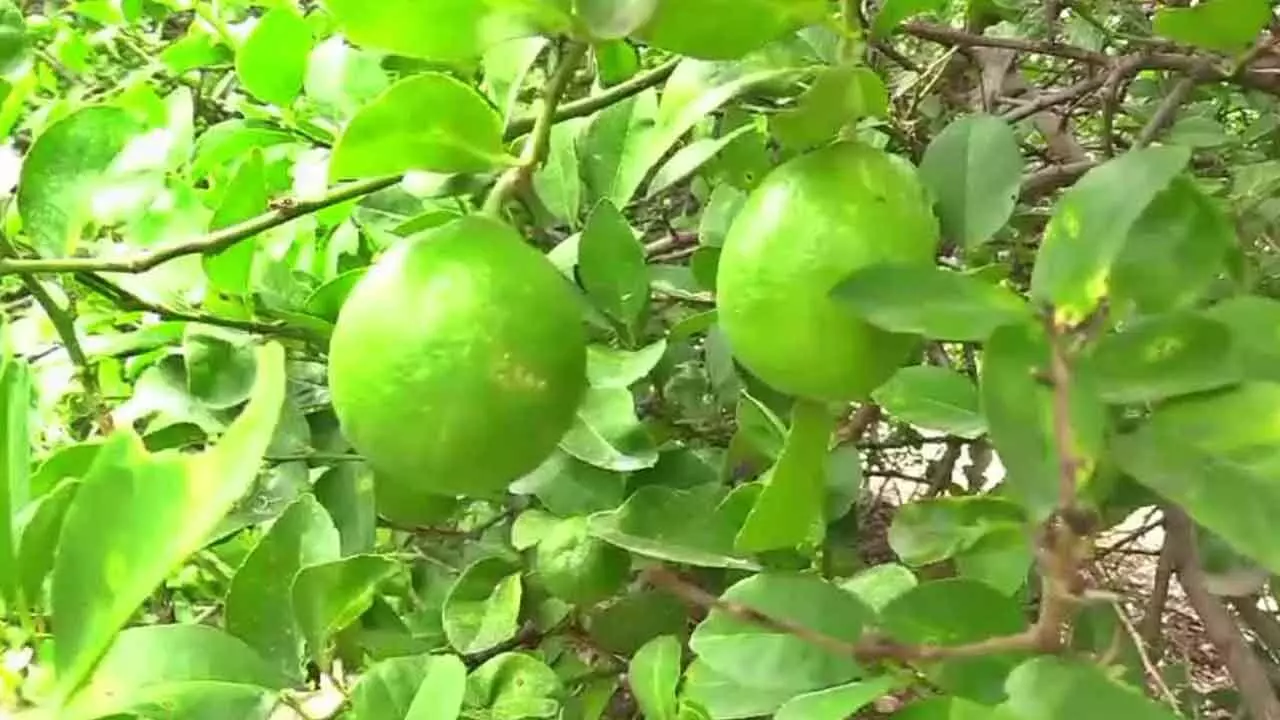Live
- Narsipatnam tank bund my dream project, says Speaker
- MLA Yashaswini slams Errabelli
- Sluggish pace persists at Stamps & Registration Office
- Kanguva’s Box Office Disaster: Is This the End of Suriya’s Mega Hit?
- Maoist killed, jawan injured in encounter
- Kerala Police Officer Brutally Murdered By Estranged Husband In Tragic Domestic Violence Case
- Pallishree Mela records good sales at Bali Jatra
- Kharif paddy purchase begins in Bargarh
- Faeces forced into tribal woman’s mouth
- Hyderabad's Air Quality Worsens as Winter Settles In | AQI Levels Reach Moderate Range
Just In
Lemon farmers reap big benefits in Vijayapura


Among the various types of lemons, the Khagji variety is particularly sought after, especially since it holds the prestigious GI tag. Farmers from neighbouring districts such as Kalaburagi, Bagalkote, Raichur, Dharwad, and Belagavi are flocking to Vijayapura to purchase lemon saplings. The demand has even spread to other states, including Osmanabad in Maharashtra, as well as parts of Andhra Pradesh and Tamil Nadu
Vijayapura: Known as lemongrainage Vijayapura district has gained a reputation for its high-quality lemons, which have even been awarded a Geographical Indication (GI) tag. Despite the recognition and the establishment of a Lemon Development Board, farmers in the region have not seen much direct benefit from these initiatives. However, many lemon growers in the district are thriving independently, reaping huge profits from both lemon cultivation and sapling sales.
Vijayapura is famous for a variety of commercial crops, including grapes and lemons, with the latter being one of the district’s key agricultural products. Out of the 8,000 hectares dedicated to lemon cultivation in the district, 5,000 hectares are in the Indi taluk alone. One standout farmer, BeerappaVaggi of Tamba village, has turned his 14-acre lemon farm into a highly profitable venture. On 4 acres of this land, he cultivates and sells lemon saplings, generating substantial income.
Farmers from neighboring districts such as Kalaburagi, Bagalkote, Raichur, Dharwad, and Belagavi are flocking to Vijayapura to purchase lemon saplings. The demand has even spread to other states, including Osmanabad in Maharashtra, as well as parts of Andhra Pradesh and Tamil Nadu. This surge in demand for saplings has led many farmers in Vijayapura, particularly in Indi taluk, to dedicate significant portions of their land to establishing lemon nurseries.
These farmers carefully cultivate their nurseries, ensuring the saplings are of the highest quality. By using nutrient-rich manure and taking great care while transplanting the saplings to avoid damaging the roots, they produce healthy, robust plants that fetch good prices in the market.
The pricing for saplings varies by age, with one-year-old saplings selling for around Rs 13, two-year-old saplings for Rs 25, and larger ones fetching up to Rs 100.
Among the various types of lemons, the Khagji variety is particularly sought after, especially since it holds the prestigious GI tag. Despite the GI tag’s intended role as a marker of quality and geographical uniqueness, farmers in Vijayapura are questioning its practical value. Many argue that neither the GI tag nor the Lemon Development Board has provided tangible benefits to them, with most of their success coming from their own efforts. As a result, farmers have called for increased government support, particularly in the form of subsidies for lemon growers.
A GI tag is a recognition given to products that are tied to a specific geographical region, identifying unique characteristics, quality, or reputation associated with that area. While the GI tag is meant to enhance the product’s marketability, Vijayapura’s farmers believe more needs to be done to ensure they see the full benefits from such initiatives.

© 2024 Hyderabad Media House Limited/The Hans India. All rights reserved. Powered by hocalwire.com






